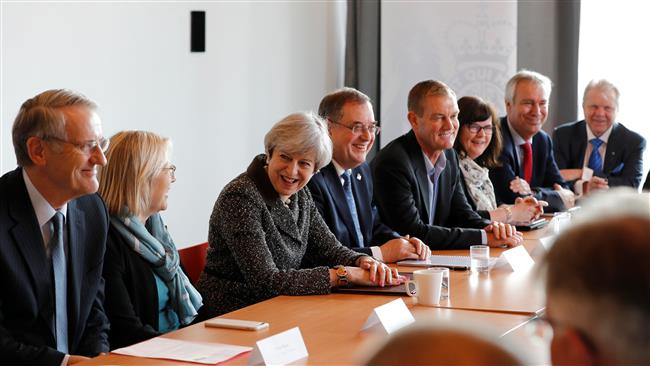UK Prime Minister Theresa May will trigger the process of Britain’s withdrawal from the European Union (EU) on Wednesday, launching the two year exit negotiations likely to be the most complex London has held since World War Two.
Speaking on Tuesday, a day before London intends to invoke Article 50 of the EU Treaty, the mechanism for starting the Brexit process, May said Britain is facing “one of the most significant moments” in its recent history.
She said her goal was a special partnership with the EU after Brexit, but added that a “global Britain” could establish new alliances outside the union.
Talking to reporters at the Qatar-UK Business and Investment Forum in Birmingham, where the Persian Gulf emirate announced £5 billion of more investment in Britain, May said this was “one of the most significant moments the UK has faced for many years.”
“Tomorrow we begin the negotiations to secure a new deep and special partnership with the European Union. As we do so I am determined we should also seize this historic opportunity to get out in to the world and to shape an even bigger role for a global Britain,” she stated.
“This means not just building new alliances but going even further in working with old friends who have stood alongside us for centuries,” the British premier said.
The United Kingdom held a referendum last June in which Britons voted by a 52-48 percent margin to leave the EU, the first member state ever to do so.
Brexit Minister David Davis has said the withdrawal process will take Britain to “the threshold of the most important negotiation for this country for a generation.”
The notification of triggering Article 50 will come in the form of a letter to Tusk, which will likely plunge Britain into a period of intense uncertainty.
Article 50 allows for two years of talks to decide an EU member state’s separation terms, “taking account of the framework for its future relationship with the Union.”
May has said she wants to make Brexit as painless as possible. But EU leaders, anxious to avoid encouraging others in the 28-member bloc to split, have said they will not give May an easy ride.
Although Britain as whole voted to leave the EU, Scotland and Northern Ireland voted to stay in the bloc.
The Brexit vote in June has prompted nationalists in Scotland and Northern Ireland to call for a referendum on independence from the United Kingdom.
Scotland’s First Minister Nicola Sturgeon wants her country to hold a referendum on Scottish independence immediately after Britain’s exit from the EU.
The largest Irish nationalist party, Sinn Fein, has also called for a referendum on splitting from the United Kingdom and uniting with the Republic of Ireland “as soon as possible.”
PRESS T.V
R.S

